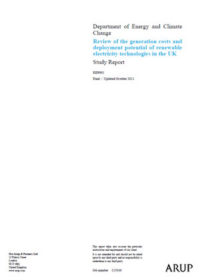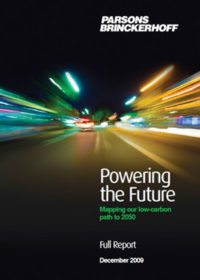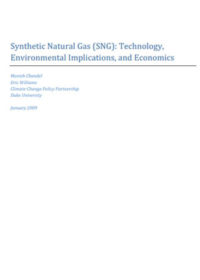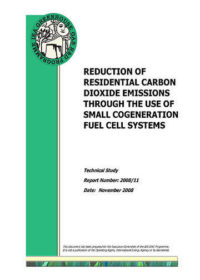Resources
Publications
Our publications, reports and research library hosts over 500 specialist reports and research papers on all topics associated with CCS.
View our Publication Library Disclaimer.
Filter by
Review of the generation costs and deployment potential of renewable electricity technologies in the UK
1st October 2011
Topic(s): Biofuels / Bioenergy, Economics, Fuel switching, Geothermal energy, Hydroelectricity, Marine energy, Renewables, Solar energy, Wind energy
Arup was appointed by the United Kingdom’s Department of Energy and Climate Change (DECC) in October 2010 to look at the deployment potential and generation costs of renewable electricity technologies in the UK up to 2030, taking into account sensitivities as to the range of cost inputs, investor behaviour and barriers to deployment. Arup was supported on cost data gathering exercises for some technologies by Ernst and Young (E&Y).
Disclaimer
The content within the Global CCS Institute Publications, Reports and Research Library is provided for information purposes only. We make every effort and take reasonable care to keep the content of this section up-to-date and error-free. However, we make no claim as to its accuracy, currency or reliability.
Content and material featured within this section of our website includes reports and research published by third parties. The content and material may include opinions and recommendations of third parties that do not reflect those held by the Global CCS Institute.
Powering the future: mapping our low-carbon path to 2050
1st December 2009
Topic(s): Carbon capture use and storage (CCUS), Domestic policy, Economics, Fuel switching, Policy law and regulation, Renewables
Powering the Future evaluates options for CO2 emissions reduction across all sectors of the UK economy. Incorporating government published statistics on the current energy consumption and CO2 emissions of each sector, it creates models that allow each improvement option to be analysed and evaluated. Scenario analysis is used to apply a consistent set of such options across all the sectors to evaluate overall CO2 emissions and to compare the value of the different options.
Disclaimer
The content within the Global CCS Institute Publications, Reports and Research Library is provided for information purposes only. We make every effort and take reasonable care to keep the content of this section up-to-date and error-free. However, we make no claim as to its accuracy, currency or reliability.
Content and material featured within this section of our website includes reports and research published by third parties. The content and material may include opinions and recommendations of third parties that do not reflect those held by the Global CCS Institute.
Synthetic natural gas (SNG): technology, environmental implications, and economics
1st January 2009
Topic(s): Biofuels / Bioenergy, Fuel switching, Renewables
Natural gas that can be produced from coal or biomass is known as ’synthetic natural gas’ or ’substitute natural gas’ (SNG). This Duke University paper examines the different technologies for SNG generation, the cost, and the environmental impacts of SNG. The paper identifies the conditions under which SNG production could be economically viable.
Disclaimer
The content within the Global CCS Institute Publications, Reports and Research Library is provided for information purposes only. We make every effort and take reasonable care to keep the content of this section up-to-date and error-free. However, we make no claim as to its accuracy, currency or reliability.
Content and material featured within this section of our website includes reports and research published by third parties. The content and material may include opinions and recommendations of third parties that do not reflect those held by the Global CCS Institute.
Reduction of residential carbon dioxide emissions through the use of small cogeneration fuel cell systems
11th November 2008
Topic(s): Energy efficiency, Fuel switching
Combined heat and power systems (CHP) enable users to operate with increased overall efficiency thus reducing consumption of fossil fuels and green house gas emissions. This study investigates the potential of fuel cell based CHP systems in domestic and small commercial applications to reduce green house gas emissions. Fuel cells in this application have advantages of very low emissions and potentially higher power to heat ratios than other CHP systems.
Disclaimer
The content within the Global CCS Institute Publications, Reports and Research Library is provided for information purposes only. We make every effort and take reasonable care to keep the content of this section up-to-date and error-free. However, we make no claim as to its accuracy, currency or reliability.
Content and material featured within this section of our website includes reports and research published by third parties. The content and material may include opinions and recommendations of third parties that do not reflect those held by the Global CCS Institute.



